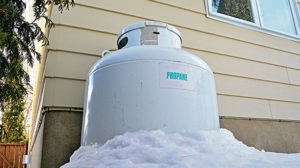Shovel snow safely and keep warm in frigid temperatures

It’s important to take steps to avoid frostbite and hypothermia when shoveling in cold temperatures. Photo: ziggy1/iStock / Getty Images Plus/Getty Images
“Let It Snow” is a great Christmas and winter romance tune sung by legends like Frank Sinatra and Dean Martin.
Snow and cold weather are good for business, but propane professionals don’t have the luxury of staying cozy indoors while avoiding the “frightful” weather outside.
Let’s remember the challenges that heavy, wet snow and frigid temperatures bring to propane professionals and customers as they shovel paths to their tanks.
Every year, residential propane customers are asked to clear paths to allow propane professionals to access their tanks to deliver fuel.
Because propane professionals are so accommodating to their customers, many will do this laborious work themselves, especially for customers unable to do so.
Whether it’s your driver or customer doing the shoveling, I offer the following statistics and safety tips to pass on.
According to a study published in the American Journal of Emergency Medicine, each year about 11,500 people in the United States are treated in emergency rooms for injuries, more than half of which are soft tissue injuries related to snow shoveling. On average, 100 of those injuries are fatal.
Sudden exertion in cold weather after being sedentary for several months can put a significant strain on the heart and cause heart attacks. This is true even in healthy people, so please consider communicating the following to your employees and customers:
- Push the snow rather than lift it. If you do lift it, use a small shovel or only partially fill the shovel.
- Lift with your legs, not your back.
- Do not work to exhaustion.
- Know the signs of a heart attack. Stop immediately and call 911 if you’re experiencing any of them. Every minute counts.
- Do not shovel after eating or while smoking.
- Take it slow and stretch before you begin.
Avoiding frostbite
Frostbite is another hazard of snow shoveling and other winter outdoor tasks with which your employees and customers may have to contend. Even skin that is protected can be subject to frostbite, which can cause tissue death and amputation if not handled properly.
If you suspect frostbite, note the following action items and consider passing them to your employees and customers:
- Move the victim out of the cold and into a warm place.
- Remove wet clothing and constricting items.
- Protect between fingers and toes with dry gauze.
- Seek medical attention as soon as possible.
- Warm the frostbitten area in lukewarm water (99 to 104 degrees) for 20 to 30 minutes only if medical care will be delayed and if there is no danger of the skin refreezing.
- Do not use chemical warmers directly on frostbitten tissue.
- Protect and elevate the frostbitten area.
Hypothermia
Severe shivering is one of the first signs of hypothermia, a condition that occurs when the body’s core temperature drops below 95 degrees. In such cases, it’s important to keep the body warm. As hypothermia progresses, shivering gives way to drowsiness, confusion, shallow breathing, irregular heartbeat, slurred speech, loss of coordination, and eventually, unconsciousness and death.
If you encounter someone suffering from hypothermia, note the following:
- Check responsiveness and breathing, and call 911.
- Quickly move the victim out of the cold.
- Remove wet clothing.
- Warm the victim with blankets or warm clothing.
- Do not rub or massage the victim’s skin.
- Give warm (not hot) drinks to an alert victim who can easily swallow, but do not give alcohol or caffeine.
All of these steps are not a substitute for proper medical care, so be sure to seek medical attention for frostbite and hypothermia as soon as possible.
I wish you and your families peace, prosperity and love in 2021. Let’s commit to doing all we can to stay safe.
Stuart Flatow spent 18 years as the Propane Education & Research Council’s vice president of safety and training before stepping down in February 2019.
NOTE: The opinions and viewpoints expressed herein are solely the author’s and should in no way be interpreted as those of LP Gas magazine or any of its staff members.
















